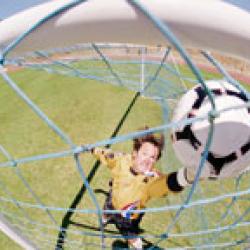Source Institutions
Source Institutions
Add to list Go to activity
Activity link broken? See if it's at the internet archive

In this activity, learners investigate the properties of different types of balls. Learners conduct experiments on four different balls to see which can bounce the highest and which continues bouncing for the longest period of time. Use this activity to talk about how each ball's properties are appropriate for their respective sport. This activity also coincides well with math graphing practice.
- Under 5 minutes
- 1 to 2 hours
- free per group of students
- Ages 8 - 11
- Activity, Experiment/Lab Activity, Lesson/Lesson Plan
- English
Quick Guide
Materials List (per group of students)
- 4 different balls to test, such as a super ball, tennis ball, basketball, kickball, baseball, etc.
- 1 stopwatch per group
- 1 yardstick per group
- Worksheets
Subjects
-
Engineering and Technology
-
Engineering
- Metallurgy and Materials Engineering
-
Engineering
-
Mathematics
-
Data Analysis and Probability
- Data Analysis
- Data Collection
- Data Representation
- Measurement
-
Data Analysis and Probability
-
Physical Sciences
-
Motion and Forces
- Gravity
-
Structure and Properties of Matter
- Atomic Structure
-
Motion and Forces
-
The Nature of Science
-
The Scientific Process
- About Inquiry
- Conducting Investigations
- Gathering Data
- Communicating Results
-
The Scientific Process
Informal Categories
- Physical Activity
- Sports and Exercise
- Toys
Audience
To use this activity, learners need to:
- see
- read
- touch
Learning styles supported:
- Involves teamwork and communication skills
- Involves hands-on or lab activities
Other
Components that are part of this resource:
- Ball Characteristics Worksheet
- Ball Characteristics Worksheet
- Ball Bounce Experiment 1 Worksheet
- Ball Bounce Experiment 1 Worksheet
- Ball Bounce Experiment 1 Bar Graph
- Ball Bounce Experiment 1 Bar Graph
- Ball Bounce Experiment 2 Bar Graph
- Ball Bounce Experiment 2 Bar Graph
- Test Worksheet
- Test Worksheet
Includes alignment to state and/or national standards:
Includes assesments for student learning:
This resource is part of:
Access Rights:
- Free access
By:
Source Collection
- TeachEngineering
Rights:
- All rights reserved, Regents of the University of Colorado, 2013
